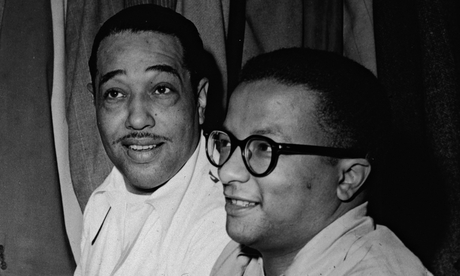
Blood Count (R4) | iPlayer
Lives in a Landscape (R4) | iPlayer
The Reunion (R4) | iPlayer
PM (R4)
There is a kind of fake American accent that is only ever to be heard in radio plays. It's not fake in a bad way. Not fake like, say, the hysterical laughter of the sidekick on zoo-format radio shows after the gormless DJ says anything. But fake like an inoffensive reproduction that obviously isn't the real thing. There were a few of those in the afternoon drama Blood Count, but at its centre was the mellifluous and thoroughly authentic voice of Clarke Peters as jazz legend Duke Ellington.
The play, by Ian Smith, examined the relationship between Ellington and his musical collaborator and fellow composer Billy Strayhorn – and has anyone ever been christened with a cooler jazz name?
Strayhorn was a gifted pianist who found refuge in jazz, having been excluded by racism from his first love, classical music. He was also gay, and by the mid-60s dying from oesophageal cancer – the drinker's cancer. His last composition was the eponymous Blood Count.
The dramatic triangle was formed in the play by a female Time magazine journalist looking to expose Ellington as an exploiter of Strayhorn and other musicians. It provided the opportunity for plenty of musical, poetical and political musings: WB Yeats, Marcel Duchamp and Socrates all got knowing name checks in the philosophical back and forth between the characters.
None of it was particularly convincing, but it made for an enjoyable meditation on the nature of musical creativity and collaboration. And the joy of hearing Peters wrap that great instrument of a voice around his professorial monologues was like sinking into a lovely series of note-perfect solos.
Pat Mallon never enjoyed Strayhorn's, let alone Ellington's, success, but he did for many years share his intense relationship with the demon booze. In Lives in a Landscape we heard the poignant tale of how whisky drove the West Country country singer to lose his fortune, his house, his marriage and his shot at fame.
At one time, Mallon performed in front of 2,000 people in Falmouth. "I thought, this is it – I've made it," he recalled. "Then I had my first heart attack."
There were several lines like that, cheery reminiscences that jackknifed into bleak reflections. But it was also a story of redemptive love – with his fourth wife, Hayley, for whom Mallon gave up drinking. They met when he was living in a caravan. Now they tour together, singing country standards and middle-of-the-road classics.
"She lives for me and I live for her," explained Mallon. "It's as simple as that." Except that that touching simplicity was complicated by the possibility of Mallon not doing any more living. He had been diagnosed as suffering from an aneurysm and he said doctors had not given him healthy odds on surviving. But the pair of them kept on touring around the pubs and clubs of the West Country. They had to, they said, to pay the rent.
They sounded like a great couple. Someone should write a country and western song about them.
I'm always impressed by how former foes bury the hatchet on The Reunion. But not last week, when the assembled group sounded more like they wanted to bury that hatchet in each other. The occasion was the 30th anniversary of the dispute that led to the 1984 miners' strike. On one side was Ken Clarke, a member of Margaret Thatcher's cabinet, and Bill King, a former police inspector, and on the other Mel Hepworth, a flying picket, and Barbara Jackson, a striker who worked for the Coal Board. Clarke and King were unrepentant and Hepworth and Jackson unforgiving. Only Kim Howells, an NUM official who later became a Labour minister, seemed interested in any shades of grey.
Talking of grey, the highlight of the week was Penelope Lively speaking to Eddie Mair about ageism on PM. When asked what age she'd like to be again, she replied: "Fifty five." At last, something to look forward to.

